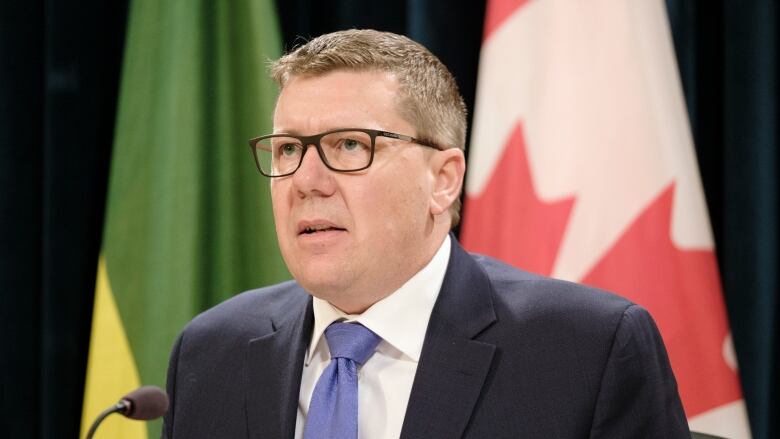Supreme Court's carbon tax ruling means it's time for Moe to take the climate challenge seriously
Moe must show some true leadership

This Opinion piece is by Sarath Peiris, who spent his career at the Moose Jaw Times Herald and Saskatoon StarPhoenix, and was the StarPhoenix's opinions editor and editorial writer.
For more information aboutCBC's Opinion section, please see theFAQ.
Anyone who thinks that Thursday's Supreme Court rulingthat upheld the constitutionality of the federal carbon tax has ended the matter need only look to Premier Scott Moe's begrudging concession that Saskatchewan would abide by the decision on the province's own terms.
Casting one wary eye on the Buffalo Party and another on the interests of the energy sector, Moe clung to the dissenting opinions, describing the 6-3 decision as "simply wrong" and saying itupheld bad environmental and economic policies, and openedthe door to wider federal intrusion into provincial jurisdiction.
Rather than the issue being settled, what seems more likely is monthsor even years of endless political bickering between Moe and the federal Liberal government, unless Erin O'Toole's Conservatives miraculously get elected anytime soon with their promise to rescind the carbon tax.
Judging by Opposition Leader Ryan Meili's initial reaction to the ruling, not even the improbableelection of the NDP in Saskatchewan would offer any relief from this endless fighting in a province where fed bashing has become de rigueur for all parties. Meili seems no less intent than Moe on pandering to base politics that ignore the imperative of acting in the national interest that the Supreme Court stressed.
Saskatchewan residents, who are currently filling out their income tax forms or will be soon, may wonder at claims by both Moe and Meili about the harsh impact of the carbon tax on Saskatchewan families. There, right on the tax forms, is a rebate on the federal carbon tax that in many cases matches or exceeds what they've paid.
As for the argument that the carbon tax of about seven cents per litre being charged at the fuel pump is a heavy burden, surely it's not too tough to realize that the intended purpose is indeed to discourage consumptionand thus reduce carbon emissions.
The tax might not be particularly effective because it's set too low to have a noticeable immediate impact on carbon consumption notice there's not been a peep from drivers to 16-cent hikes at the pump over the last couple of weeks by oil companies but that doesn't mean it's bad environmental or economic policy.
If anything, the tax should be higher to achieve its goal the very opposite of the instant rebate at the pump that Moe is promising as Saskatchewan's policy response to the court ruling.
It has been within Saskatchewan's control all along to develop its own carbon reduction policies that include accommodations for agricultural producers, rural residents and others.- Sarath Peiris
Rather than continue to tilt against windmills (or solar panels or geothermal wells), it's time for the Saskatchewan government and Moe to show true leadership in the battle against climate change by taking the challenge seriously.
This shouldn't be a battle for votes against the blustering Buffalo gang and their ridiculous separatist notions. It shouldn't be about blindly trying to throw out Trudeau's Liberals by backing a party that can't even get its act together on accepting the clearly evident and growing threat posed by increasing carbon emissions.
Moe suggested Thursday that the federal government should work with Saskatchewan on everything from developing small nuclear reactors to greenhouse gas offsets for large emitters. But that has to be a well-intentioned dialogue, not an occasion for one-sided demands accompanied by the tiresome grievance politics that have been Moe's hallmark in federal relations so far.
It has been within Saskatchewan's control all along to develop its own carbon reduction policies that include accommodations for agricultural producers, rural residentsand others.
Saskatchewan could already have measures in place through rebates for fuel used in grain drying or hauling, credit for carbon storage in soil or other measures agreed upon with Ottawa instead of engaging in incessant finger-pointing and demands that the feds yield sole jurisdiction on an issue that has national and international impacts, as the high court so rightly recognized.
Now that the court has clipped the wings of Saskatchewan, Alberta and Ontario, let's hope that Moe and his colleagues seize the opportunity to balance the long-term survival interests of the people they are elected to serve including those who support other political parties against the immediate economic needs of industries that provide employment and revenues.
Interested in writing for us? We accept pitches for Opinion and First Person pieces from Saskatchewan residents who want to share their thoughts on the news of the day, issues affecting their community or who have a compelling personal story to share. No need to be a professional writer!
Read more about what we're looking for here, then emailsask-opinion-grp@cbc.cawith your idea.












_(720p).jpg)


 OFFICIAL HD MUSIC VIDEO.jpg)
.jpg)



























































































